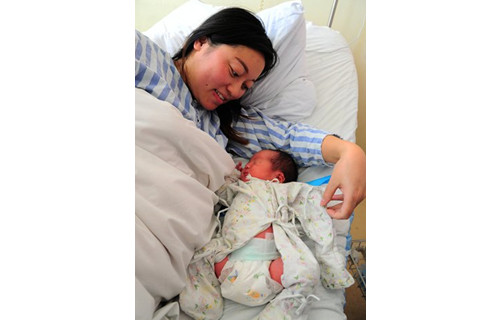导读:妈妈们将孩子生下来十分辛苦,产假令她们有时间恢复健康,且能更好的照顾婴儿。自全面二胎以来,多个省市的产假已延长至158天,西藏则可休一年。

A total of 30 regions in China have extended paid maternity leave to up to one year, one of the supportive measures introduced after the country changed its family planning policy to allow all couples to have a second child in 2016.
中国共有30个省份将产假延长,最长可达一年,这是自中国从2016年改变了计划生育政策,允许夫妻生二个孩子以来,出台的一项支持性措施。
Maternity leave in most provinces and municipalities has been extended to around 158 days, with the longest leave on offer being one year in Southwest China’s Tibet Autonomous Region. New mothers in Northwest China’s Gansu Province and Northeast China’s Heilongjiang Province are entitled to 180 days paid time off work, while in Shanghai, Tianjin and East China’s Zhejiang and Jiangsu provinces leave has been increased to 128 days, according to The Beijing News.
大多省市的产假都已延长到了158天,而位于中国西南部西藏自治区的产假则长达一年。在中国西北部甘肃省和东北部黑龙江省的新妈妈则有180天的有薪产假,上海、天津和中国东部浙江、江苏省的产假也增加到了128天,据《新京报》报道。
The extensions were made based on the amended Law on Population and Family Planning which was approved in 2016. All women who give birth are guaranteed up to three months of additional maternity leave in addition to the 98 days originally mandated, and their spouses can enjoy paid paternity leave of 15 days, according to the revised law.
产假的延长是基于修订版的《人口与计划生育法》,该法案于2016年获批。所有女性的产假都由此前的98天增加到了三个月以上,根据修正法案,配偶也可享有15天的陪产假。
Experts believe that the popular extensions should also create leeway for both female employees and their companies as longer leave may adversely affect women’s career development and increase the financial burden on enterprises.
专家认为,广受欢迎的产假延长对于女性员工和企业来说也是一把双刃剑——因为长期休假可能会对女性的职业发展产生不利影响,并增加企业的财务负担。
The Tibet Health and Family Planning Commission published a notice on the two-child policy on July 5, which said that women with a Tibet household registration, or hukou, who work for organizations, enterprises and public institutions are entitled to have one year of paid maternity leave with each child to which they give birth. Their spouses can enjoy 30 days of paternity leave, according to the website of the commission.
西藏卫生和计生委员会在7月5日下发了一个通知:凡在各级组织、企事业单位工作的西藏户籍的女性职工,每胎可享受一年的产假,他们配偶可以享受30天的护理假,据该部门网站显示。
Family planning policies are more relaxed in Tibet as they mostly apply to ethnic Han. Ethnic Tibetans are not restricted by the policies.
在西藏,计划生育政策更为宽松,因为它们大多适用于汉族。藏族不受政策的限制。
Tibet has a population of 3 million, according to a 2010 census, with at least 90 percent of residents being ethnic Tibetans, while the number of ethnic Hans is 245,000, accounting for eight percent, the Xinhua News Agency reported.
据2010年人口普查,西藏共有人口300万,其中至少有90%是藏族,汉族人口有24.5万,仅占8%,新华社报道。
Guan Xinping, an expert on social policy at Nankai University in Tianjin, told the Global Times that maternity leave is particularly long in Tibet partially due to the region’s harsh climate and natural conditions.
天津南开大学社会政策专家关新平接受《环球时报》采访时说,西藏的产假特别长主要是由于该地区恶劣的气候和自然条件。
The extensions to maternity leave are likely to be welcomed by a majority of netizens, as a survey conducted by China Youth Daily in 2016 showed that 89 percent of the 2,966 respondents wanted an extension to maternity leave, and 40 percent of them hoped it would be extended to six months.
产假延长受到大多数网友的欢迎,2016年由《中国青年报》进行的一项调查显示,2966名受访者中,89%的人希望延长产假,其中40%的人希望延长至半年。
"To be more precise, the additional maternity leave is for infant care, as women’s health is usually restored after the 98 mandated days," Guan said.
关说,“更确切地说,额外的产假是为婴儿护理而设的,因为产妇的身体通常能在98天后恢复。”
As mother and father should take on the both responsibility for taking care of infants, women and their partners should be entitled to the same amount of leave, according to Guan.
关介绍,由于父母要承担起照顾婴儿的责任,故女性和他们的配偶应当享有同样天数的产假。
Many netizens echoed Guan calling for an increase of the paternity leave which in most places is about 15 to 30 days.
许多网友响应关的呼吁,认为男性陪产假也应当增加。现在大多地方是15到30天。







